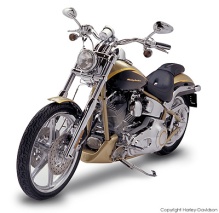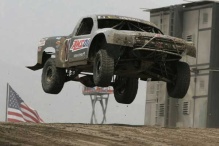An Education in Grease
According to the Practical Handbook of Lubrication, grease is a lubricant composed of a fluid lubricant thickened with a material that contributes a degree of plasticity. Greases are typically used in areas where a continuous supply of oil cannot be retained, such as open bearings or chassis components.
Grease Components
Greases are comprised of two basic structural components: a base fluid and a thickening agent. Different types and combinations of thickeners and base fluids, along with supplemental structure modifiers and performance additives, combine to give the final product its special lubricating properties.
Base Oil
Many different types of base oil may be used in the manufacture of a grease, including petroleum (napthenic,
parafinic) and synthetic (PAO's, esters, silicones, glycols). Just as with motor oils and transmission fluids,
the viscosity of the base oil is the most significant property. A lighter, lower viscosity base oil is used to
formulate low temperature greases, while a heavier, higher viscosity base oil is used to formulate high
temperature greases.
With outstanding lubricating abilities in temperature extremes, AMSOIL greases offer a wider range of application
than conventional greases.
Thickener is the term describing the ingredients added to a base oil in order to thicken it to a grease
structure. The two basic types of thickeners are organic thickeners and inorganic thickeners. Organic thickeners
can be either soap-based or non-soap based, while inorganic thickeners are non-soap based.
Simple soaps are formed with the combination of a fatty acid or ester (of either animal or vegetable origin) with
an alkali or alkaline earth metal, reacted with the application of heat, pressure or agitation through a process
known as saponification. The fiber structure provided by the metal soap determines the mechanical stability and
physical properties of the finished grease.
In order to take on enhanced performance characteristics, including higher dropping points, a complex agent is
added to the soap thickener to convert it to a soap salt complex thickener. The greases are then referred to as
"complexes" and include lithium complex greases like those provided by AMSOIL.
Additives
Chemical additives are added to greases in order to enhance their performance, much like the additives added to lubricating oils. Performance requirements, compatibility, environmental considerations, color and cost all factor into additive selection.
Grease Properties
Grease consistency correlates to the firmness of the grease. Depending on the applications they're designed
for, greases can range from semifluid consistencies to almost solid. Care must be taken to select the correct
consistency for the application. If the grease is too hard, it may not adequately flow to the areas in need of
lubrication. If it is too soft, it may leak away from the desired area. Since consistency directly correlates to
pumpability, equipment greased through a dispensing system may require a grease representing a compromise between
what is required for lubrication and what can be adequately pumped.
Consistency is measured with the ASTM Cone Penetration Test D 217. Under prescribed conditions, a standardized
cone is allowed to drop into the grease for 5 seconds. The level of penetration is measured to determine its NLGI
consistency number, ranging from 000 to 6. The higher the penetration number, the lower the consistency
number.
Oxidation stability has to do with the performance of a grease after being exposed to oxygen. Both the ASTM D 942
Bomb Oxidation Test and the ASTM D 3527 High Temperature Bearing Life Test are used to measure oxidation.
Exposure to water may effect greases in several ways. First, it can cause grease to change consistency, becoming
softer or firmer. Second, it may change the grease's texture, perhaps becoming less adhesive. Third, it may form
an emulsion with the grease, losing its lubricating effectiveness or washing away.
The Water Washout (ASTM D 1264) Test and Water Spray Off (ASTM D 4049) Test measure the amount of grease washed
away from various water washing and spraying conditions. The Rust ASTM D 1743 measures rust inhibiting
characteristics and the ASTM D 4048 measures copper corrosion.
A lubricant's main job is to separate bearing surfaces to prevent wear. If the amount of lubricant is inadequate,
the lubricant film becomes so thin that some parts come into contact with part of the surfaces being separated.
Known as boundary lubrication, it causes a modest level of wear on one or both bearing surfaces.
Lubricants differ in their load-carrying abilities, sometimes keeping the film thicker and sometimes acting
chemically on the surfaces to prevent them from welding.
Three separate tests for load-carrying capability are used. The Four-Ball Wear ASTM D 2266 measures wear at light
loads, while the Four-Ball EP ASTM D2596 and Timken EP ASTM D 2509 indicate more severe wear or welding.

AMSOIL offers a full line of premium synthetic lubricating greases, including Multi-Purpose Grease, Heavy-Duty Grease, Racing Grease, X-Treme Food Grade Grease and Water Resistant Grease. AMSOIL greases effectively reduce friction and wear, keeping components running clean and trouble free.
The AMSOIL Multi-Purpose GL Series of greases consist of the GLA (NLGI #0), GLB (NLGI #1 GC/LB) and GLC (NLGI
#2 GC/LB) grades, as well as the GLC Multi-Purpose Spray Grease. The greases in the GL Series contain the same
viscosity base oils and additives, but contain different amounts of thickener. GLA contains the least thickener,
making it more suitable for cold temperature applications, while GLC contains more thickener, making it better
suited for high temperature, moisture and speed applications.
AMSOIL Multi-Purpose Greases are ideal for automotive wheel bearings and electric motors, while the Multi-Purpose
Spray Grease works perfectly for hard-to-reach equipment such as hinges and springs.
The AMSOIL Heavy-Duty GH Series of greases consist of the GHB (NLGI #1 GC/LB) and GHD (NLGI #2 GC/LB) grades.
AMSOIL GHB and GHD contain the same viscosity base oils and additives, differing only in the amount of thickener.
GHB contains less thickener than GHD, making it ideal for cold weather applications.
AMSOIL Heavy-Duty Greases provide outstanding protection in four wheel drive steering knuckles, spring shackles
and other components exposed to high-load, high-speed conditions. AMSOIL GRG Series 2000 Racing Grease (NLGI #2
C/LB) is ideal for vehicles in which the brakes are applied frequently. It offers unsurpassed high temperature
protection, providing the ultimate protection for hard-driven, high-performance vehicles.
AMSOIL GWR Water Resistant Grease (NLGI #1.5 GC/LB) provides outstanding performance in wet environments, such as
those found in boat trailer wheel bearings. It effectively resists both water washout and degradation.
AMSOIL GXC X-Treme Food Grade Grease (NLGI #2 H-I) provides superior, non-toxic lubrication in food and
pharmaceutical industry equipment. It reduces friction, wear and heat in temperature extremes from -35°F to
400°F.
AMSOIL Synthetic GVC Lithium Complex High Viscosity Grease (NLGI #2) is a lithium complex thickened grease
blended with premium ISO-320 synthetic base oils. This grease is fully compounded with additives providing EP
protection, oxidation resistance and rust and corrosion protection. AMSOIL GVC is shear stable, maintaining its
viscosity and consistency in the presence of mechanical activity, and GVC stays in place by resisting water
washout.
We're now on Facebook!

Buy at wholesale price!
Preferred Customers buy at dealer cost and save 25%!

Not sure which products to get for your vehicle? Use the Vehicle Lookup Guide.

AMSOIL Distributor Opportunities
Start your own home business based on a proven superior product. Very low startup costs.

Sell AMSOIL products in your shop or store. Click here for information on AMSOIL retail accounts.

Does your business purchase lubricants for its equipment? Click for information about AMSOIL commercial accounts! Extend your equipment's life and reduce costs!


